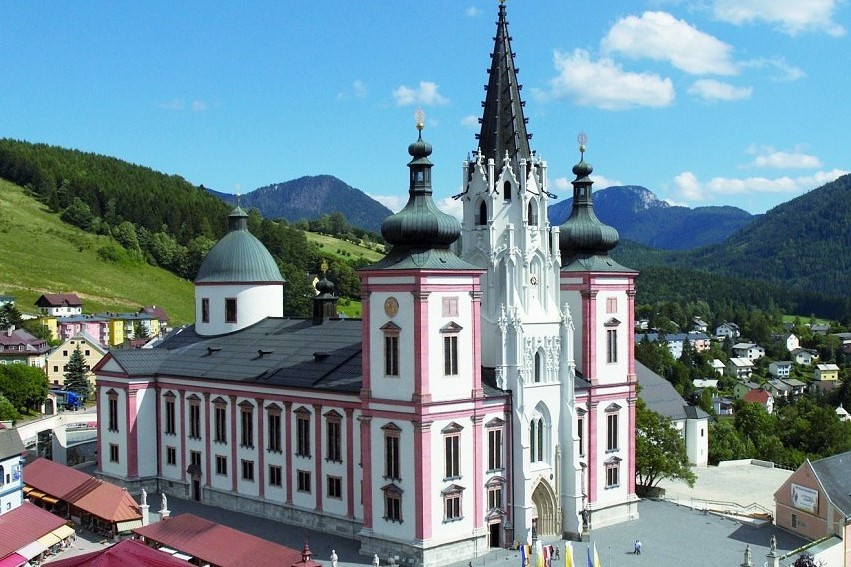Aktualisierung erforderlich!
Um die AudioDatei abspielen zu können, aktualisieren Sie bitte Ihren Browser oder installieren Sie eine aktuelle Verison des Flash plugins.
Papst Benedikt XVI. besucht Österreich
Programm der Apostolischen Reise Seiner Heiligkeit Benedikts XVI. nach Österreich aus Anlass des 850-Jahr-Jubiläums des Heiligtums von Mariazell
(7. bis 9. September 2007)
Freitag, 7. September 2007
| 09.30 Uhr |
Abflug von Rom-Ciampino nach Wien-Schwechat |
| 11.15 Uhr |
Ankunft auf dem internationalen Flughafen Wien-Schwechat - Begrüßungszeremonie auf dem Flughafen (Ansprache des Heiligen Vaters) |
| 12.00 Uhr |
Autofahrt vom Flughafen zum Platz Am Hof, auf der Fahrtroute Umsteigen in das "Papamobil" |
| 12.45 Uhr |
Ankunft auf dem Platz Am Hof. Gebet vor der Mariensäule auf dem Platz Am Hof (Grußworte des Heiligen Vaters) |
| 13.30 Uhr |
Fahrt im "Papamobil" zum Judenplatz |
| 13.35 Uhr |
Stilles Gedenken vor dem Mahnmal für die österreichischen Opfer der Shoah auf dem Judenplatz |
| 13.40 Uhr |
Fahrt im "Papamobil" vom Judenplatz zur Apostolischen Nuntiatur |
| 13.50 Uhr |
Ankunft in der Apostolischen Nuntiatur |
| 17.15 Uhr |
Autofahrt zur Hofburg |
| 17.30 Uhr |
Ankunft in der Hofburg Höflichkeitsbesuch beim Bundespräsidenten. Begegnung mit Vertretern des öffentlichen Lebens und des Diplomatischen Corps (Ansprache des Heiligen Vaters) |
| 18.45 Uhr |
Autofahrt von der Hofburg zur Apostolischen Nuntiatur |
| 19.00 Uhr | Ankunft in der Apostolischen Nuntiatur |
Samstag, 8. September 2007
| 08.00 Uhr |
Autofahrt von der Apostolischen Nuntiatur zum Heldenplatz |
| 08.15 Uhr |
Abflug mit Hubschrauber vom Heldenplatz nach Mariazell |
| 09.15 Uhr |
Ankunft auf dem Flugfeld Mariazell |
| 09.25 Uhr |
Fahrt im "Papamobil" zur Basilika |
| 09.45 Uhr |
Ankunft vor der Basilika |
| 10.30 Uhr |
Heilige Messe aus Anlass des 850-Jahr-Jubiläums der Gründung des Heiligtums von Mariazell auf dem Vorplatz der Basilika (Predigt des Heiligen Vaters) |
| 12.30 Uhr |
Einzug in die Sakristei der Basilika |
| 13.30 Uhr |
Mittagessen mit den Mitgliedern der Österreichischen Bischofskonferenz und mit den Kardinälen und Bischöfen des päpstlichen Gefolges im Geistlichen Haus Mariazell |
| 16.40 Uhr |
Gang zu Fuß vom Geistlichen Haus zur Basilika |
| 16.45 Uhr |
Marianische Vesper mit Priestern, Ordensleuten, Diakonen und Seminaristen in der Basilika von Mariazell (Ansprache des Heiligen Vaters) |
| 18.00 Uhr |
Fahrt im "Papamobil" zum Flugfeld Mariazell |
| 18.20 Uhr |
Ankunft auf dem Flugfeld |
| 18.30 Uhr |
Abflug im Hubschrauber nach Wien |
| 19.30 Uhr |
Ankunft auf dem Heldenplatz und Autofahrt zur Apostolischen Nuntiatur |
| 19.50 Uhr |
Ankunft in der Apostolischen Nuntiatur |
Sonntag, 9. September 2007
| 09.15 Uhr |
Autofahrt von der Apostolischen Nuntiatur zum Erzbischöflichen Palais |
| 09.30 Uhr |
Ankunft im Erzbischöflichen Palais |
| 09.45 Uhr |
Prozession vom Erzbischöflichen Palais zum Stephansplatz |
| 10.00 Uhr |
Heilige Messe im Stephansdom (Predigt des Heiligen Vaters) |
| 12.00 Uhr |
Angelusgebet auf dem Stephansplatz (Worte des Heiligen Vaters) |
| 12.15 Uhr |
Gang zu Fuß vom Stephansdom ins Erzbischöfliche Palais |
| 14.00 Uhr |
Autofahrt vom Erzbischöflichen Palais zur Apostolischen Nuntiatur |
| 16.00 Uhr |
Autofahrt von der Apostolischen Nuntiatur zur Abtei Heiligenkreuz |
| 16.30 Uhr |
Besuch der Abtei Heiligenkreuz (Ansprache des Heiligen Vaters) |
| 17.00 Uhr |
Autofahrt von der Abtei Heiligenkreuz zum Wiener Konzerthaus |
| 17.30 Uhr |
Ankunft im Wiener Konzerthaus. Begegnung mit Ehrenamtlichen/Freiwilligen aus dem sozial-karitativen Bereich (Ansprache des Heiligen Vaters) |
| 18.45 Uhr |
Autofahrt vom Wiener Konzerthaus zum internationalen Flughafen Wien-Schwechat |
| 19.15 Uhr |
Ankunft im internationalen Flughafen Wien-Schwechat. Verabschiedungszeremonie im Flughafen (Grußworte des Heiligen Vaters) |
| 19.45 Uhr |
Abflug vom internationalen Flughafen Wien-Schwechat nach Rom |
| 21.30 Uhr | Ankunft auf dem Flughafen Rom-Ciampino |









